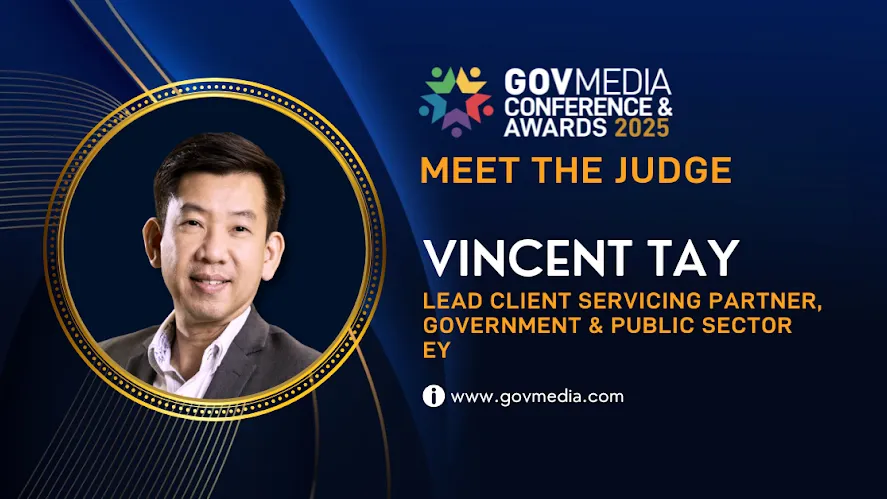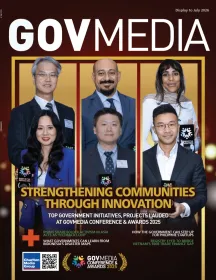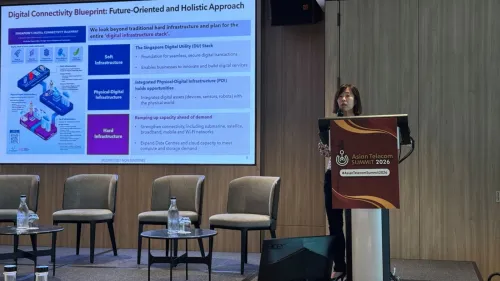
Build public trust in data to improve service delivery – EY’s Vincent Tay
He discussed driving public sector transformation through digital trust, cybersecurity, and citizen-centric innovation.
As governments face rapid digital advancements, organisations must modernise to improve efficiency, cybersecurity, and citizen trust. To meet evolving expectations and growing urbanisation, public sector organisations must embrace innovative technologies and strategic reforms for sustainable governance.
Vincent Tay, Partner, Government and Public Sector at EY, brings over 28 years of experience in information technology consulting and business transformation. He also leads the firm's Sales and Business Development efforts for the public sector market. Throughout his career, Tay has been at the forefront of driving digital transformation and empowering organisations with advanced technological capabilities.
Before joining EY, Tay's expertise spanned across various sectors, including healthcare, where he played a pivotal role in developing and growing the healthcare segment for an international technology company. He has also established a strategic partnership with Singapore's public healthcare system and led several large-scale, nationwide public sector projects, ranging from strategic studies to regulatory transformation to the implementation of digital solutions in citizen and public services.
As a judge for the GovMedia Conference & Awards 2025, Tay emphasised that a whole-of-government approach, underpinned by data-driven strategies and human-centred digital equity, is key to advancing public sector transformation.
With your extensive experience, what do you see as the most significant digital advancements shaping the government and public sector today?
Public sector data has traditionally been fragmented across siloed IT systems, limiting data sharing and increasing governments' exposure to cyber threats. Adopting a ‘Whole-of-Government’ approach fosters collaboration across departments and transitioning to fast, interoperable systems. A key focus is on developing shared registries and common platforms to ensure seamless integration, enhance operational coherence, and deliver joined-up services. Additionally, multi-agency data sharing is being prioritised to better support vulnerable populations and improve response quality.
Governments are also embedding data-driven strategies into their operations to enhance citizen outcomes and drive efficiency. By leveraging digital technologies, they are improving the citizen experience through tailored online services and data-centric decision-making. In addition, a human-centred approach is shaping service delivery, making both citizen interactions and workforce operations more agile, effective, and user-friendly.
What key challenges do government organisations face in digital transformation to enhance service delivery, and how can they effectively overcome them?
Governments must rethink outdated approaches to meet evolving workforce needs and foster a shift in leadership and culture. To attract and retain top talent, governments must enhance the employee experience and address changing workforce expectations, including preferences for flexibility and remote work and balancing multigenerational career aspirations.
With cyber threats growing in sophistication, governments will need to ramp up cybersecurity efforts to safeguard citizen trust. Cloud security is expected to see the highest investment in the next two years. Governments are adopting adaptive cybersecurity strategies by leveraging AI, continuous monitoring, and cyber threat intelligence to preempt risks, strengthen defences, and build cyber talent.
How can public sector organisations build greater trust and transparency with citizens whilst ensuring efficiency in service delivery?
Governments face a trust deficit amongst citizens regarding data usage, posing a significant challenge to advancing digital initiatives. Compared to private sector companies, governments score lower on citizen trust, with many individuals hesitant to share personal data. Building public trust in data is essential to improving service delivery.
To achieve this, governments must prioritise transparency by clearly communicating how and with whom data is shared. They must also provide clarity on the purpose of data collection and ensure that citizens understand why their information is being gathered. Additionally, empowering citizens with greater control over their personal data and its usage will be key to fostering trust and encouraging participation in digital government services.
With increasing urbanisation, in what ways can governments create future-ready cities that balance economic growth, infrastructure needs, and quality of life?
Creating equity: Enhancing opportunities and reducing vulnerabilities can improve both citizens' lives and the cities they inhabit. Whilst city leaders, urban planners, and policymakers take varied approaches, the shared goal remains: creating more equitable cities by focussing on key areas across fixing affordable housing, creating new economic centres, making livable neighbourhoods a reality, prioritising public transport, and embedding equity in policymaking.
People Power: Sustainability efforts thrive when citizens are actively involved. Cities should engage residents by listening, learning, and then leading by making people part of the plan, building on trust, empowering people through technology, and fostering behavioural change.
The Green Evolution: To create more sustainable urban centres, government leaders are reassessing development strategies to adapt policies for today and tomorrow. That may include maximising transport impact, advancing smarter and greener transportation, expanding urban planners’ and engineers’ roles, and making climate resilience a top investment priority.
Looking ahead, what long-term strategies should public sector organisations focus on to ensure sustainable and inclusive governance?
Digital transformation has become a priority for governments worldwide, with the integration of digital technologies and process reforms seen as essential for enhancing public service delivery and governance. Leveraging advanced technologies is key to driving digital transformation and improving overall public sector effectiveness; for example, AI is playing an increasing role in public services, enabling more efficient and intelligent administration. Despite its potential, digital transformation comes with challenges, including knowledge management, citizen-centric service design, institutional change, big data governance, and AI integration. Successfully addressing these barriers is crucial for realising the full benefits of digitisation, leading to better governance and improved public services.
As a judge for the GovMedia Conference & Awards 2025, what key qualities will you be looking for in the nominees to recognise excellence in the industry?
As a judge for the GovMedia Conference & Awards 2025, I will be evaluating nominees based on three critical pillars—People, Technology, and Process—to recognise true excellence in the industry.
Innovation & Advanced Technologies: Effective use of AI, data analytics, and automation to enhance efficiency, security, and citizen experience.
Human-Centred Digital Equity: Ensuring accessibility, inclusivity, and engagement to bridge digital divides and empower communities.
Efficient Use of Public Resources: Optimising funds, processes, and technology to maximise impact, accountability, and service delivery.
Excellence will be defined by transformative innovation, inclusivity, and responsible governance, ensuring technology serves both people and progress.













